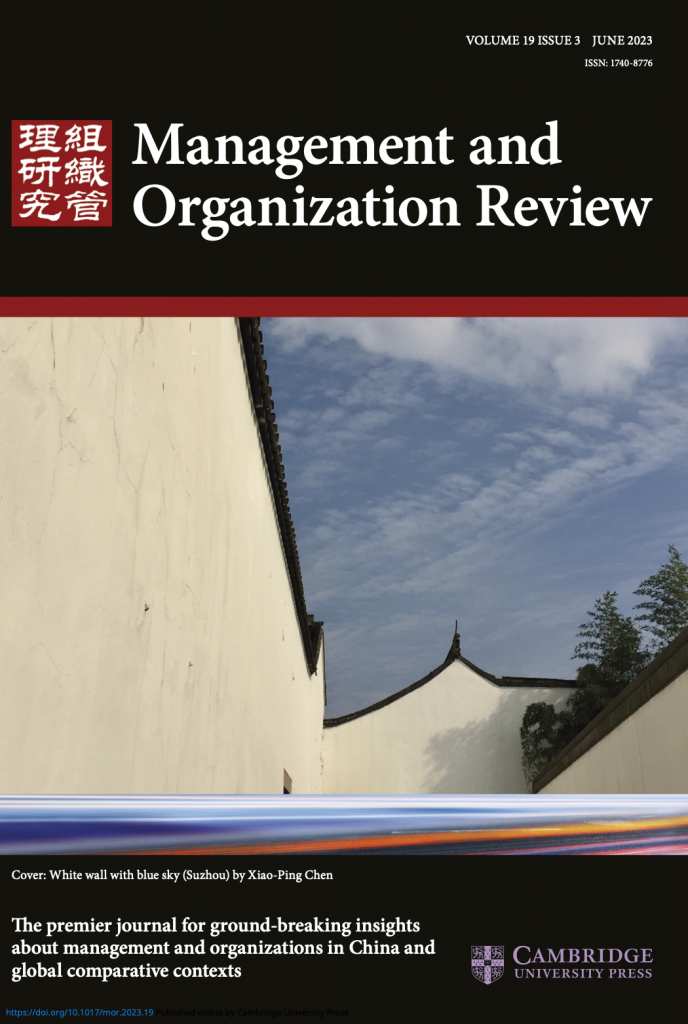《组织管理研究》第19卷第3期摘要

Functional Knowledge versus Strategic Knowledge: What Type of Knowledge Matters Most for the Long-Term Performance of Startups
Hong Jiang, Johann Peter Murmann
摘要
现有的研究表明,从在位企业流向初创企业的知识对其创建及其后的绩效有密切关系。虽然很多研究聚焦于知识的流动机制,但很少探讨究竟有哪些知识从在位企业流向了初创企业,其中又有哪些知识对初创企业的长期成功更加重要。我们对中国合成染料行业的六家私营初创企业进行了探索性的定性分析,发现在其创建过程中,有八种知识从在位企业流入了初创企业。这八种知识又可以进一步抽象为职能知识和战略知识两大类。我们发现,对创建期后得以存活的初创企业而言,创建期内从在位企业处获取的战略知识(而不是职能知识)决定了其长期竞争力。在创建期内获取的技术知识(一种职能知识)虽然对初创企业的短期生存很有必要,但不足以支撑其长期成功。这表明,来自在位企业的初始知识流对初创企业绩效的影响事实上取决于知识的类型。本研究有助于更加清晰地解释来自在位企业的知识流如何影响初创企业的绩效。
The Tradeoff Between Private Equity Sponsorship, Board Centrality, and Experience as Credible Signals for IPO Performance
Charles Kirschbaum, Luciano Rossoni, Andrea Minardi, Emília Borges da Silva
摘要
私募基金通常对其投资的公司采用各种管理和治理措施,来表现这些公司上市时的高质量。但是,私募基金的参与同样会对这些公司造成损失,一是自主权的丧失,二是上市之后的盈利的分配比。假如不选择通过私募基金来给出高质量的信号,IPO文献指出可以用其他机制来达到同样的目的:即董事会成员的经验和在业界的中心化程度。本文意在探索在预测IPO绩效时这三者之间的得失。我们对2004-2013年巴西所有的IPO进行了分析,通过其一年的累计异常回报来检验信号效应对公司长远绩效的影响。结果表明,私募基金赞助的信号是最有效的,完全取代了董事会经验和中心化程度的影响。但是,后两个因素显著影响了非盈利私募基金投资的IPO公司。此外,在私募基金投资的公司中,董事会的中心化程度对IPO业绩起了相反的作用,董事会成员以往在IPO过程中的经验对IPO业绩起到了替补的作用。
Exploration–Exploitation Duality with Both Tradeoff and Synergy: The Curvilinear Interaction Effects of Learning Modes on Innovation Types
Peter Ping Li, Heng Liu, Yuan Li, Haifeng Wang
摘要
How can a firm apply the appropriate interaction between exploration and exploitation with the goal of either radical or incremental innovation? In this study, we seek to answer this puzzling question by reframing exploitation and exploration as a duality of learning (i.e., two modes that are partial complementary for synergy as well as partial conflicting for tradeoff). Specifically, rather than assuming either a positive or negative interaction between exploration and exploitation as prior literature has done, our study highlights a novel pattern of inverted U-shaped interaction between exploration and exploitation for both radical and incremental innovations. With a Chinese sample of 508 firms, our empirical evidence supports our prediction of two patterns of inverted U-shaped interaction of exploration and exploitation. Such unique findings showcase the unique value of reframing paradox into duality from the meta-perspective of yin-yang balancing to shed new light on organizational ambidexterity and innovation management.
Open Innovation in Ecuadorian SMEs: The Importance of Strategy and the Moderating Effect of Control
Antonia Madrid-Guijarro, Ana Carolina Garcés-Torres
摘要
虽然开放式创新被认为是提升企业创新绩效的关键因素,但很少有研究关注它对于发展中国家中小企业的影响。本文研究三个问题:(1)正式制定创新战略对中小企业开放式创新活动的效应,(2)开放式创新活动对于中小企业创新绩效的影响,(3)企业管控对于开放式创新活动与创新绩效的调节作用。开放式创新包含一系列的创新方法和程序,用以刺激企业内部创新和扩大的创新的外在使用。本文作者对厄瓜多尔的543家中小企业进行了实证研究。结果表明,正式制定创新战略对企业开放式创新活动(无论内外)都有积极影响。此外,企业的对创新的外在使用总是能促进其创新绩效,但内部开放式创新活动却只有在内部管控机制存在或增加的情景中才对企业的创新绩效有正面影响。
Why and When Narcissistic Employees Are More Creative in the Workplace? A Social Cognitive Perspective
Yi-Xuan Zhao, Kong Zhou, Wen-Xing Liu
摘要
针对自恋者是否比其他人更有创造力这一问题,心理学和组织管理科学领域的学者们已经进行了一系列探讨,并得出了不一致的结论。为了化解以往的争论,本研究从社会认知理论出发,提出自恋人格和创造力之间的关系取决于个体对创造力的直接经验和间接经验中得出的创造力自我效能来解释。根据特质激活理论,组织对创造力的重视是决定自恋特质是否会促进或抑制创造力自我效能并影响其创造力的关键情境因素。具体来讲,组织对创造力的高度重视会激发自恋员工将注意力和努力投入到与创造力有关的直接和间接经验中,从而提高他们的创造力自我效能和创造力。通过对来自86个工作团队的269名全职员工进行问卷调查,我们对本研究提出的理论模型进行了实证检验。数据分析结果支持了在高创造力重视环境下,自恋特质正向影响创造力的社会认知解释。本研究不仅化解了自恋特质与创造力之间关系的争论,而且为社会认知理论和情境与人交互视角的创造力研究提供了直接的实证支持。
Choosing Beyond Compliance Over Dormancy: Corporate Response to India’s Mandatory CSR Expenditure Law
Shalini Jain, Naman Desai, Viswanath Pingali, Arindam Tripathy
摘要
This article examines whether firms engaged in high levels of voluntary CSR (corporate social responsibility) alter their strategic choices in response to detrimental public policy – specifically India’s Companies Act (2013) that mandates qualifying firms to spend 2% of their three-year average net profits on CSR. Drawing on the concept of organizational dormancy, we argue that firm capabilities, political awareness, exposure to political pluralism, and ownership identity may explain choice heterogeneity among these firms. Our key and non-intuitive finding is that even in the absence of discretionary choice in determining optimal CSR expenditure, firms are less likely to choose dormancy and instead embrace and even surpass the stipulations of the law in their CSR contributions. Also, politically aware firms are more likely to opt for dormancy over compliance. Managerial and policy implications are discussed.
